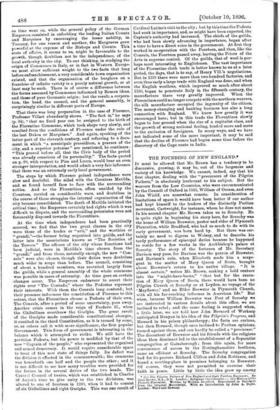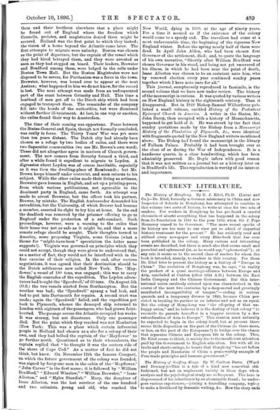THE FOUNDING OF NEW ENGLAND.*
IT must be allowed that Mr. Brown has a tendency to be discursive, growing, it may be, out of the largeness and variety of his knowledge. We cannot, indeed, say that his first chapter, dealing with the "precursors of the Pilgrim Fathers," is absolutely irrelevant to his subject. But the weavers from the Low Countries, who were excommunicated by the Council of Oxford in 1165, William of Occam, and even John Wiclif, are somewhat remote. In consideration of limitations of space it would have been better if our author had kept himself to the leaders of the distinctly Puritan movement, Cartwright, for instance, whom he does not name. In his second chapter Mr. Brown takes us to Scrooby. He is quite right in beginning his story here, for Scrooby was the home of William Brewster, pastor and elder of Plymouth Plantation, while Bradford, who had so much to do with its early government, was born hard by. But there was cer- tainly no need to digress to Wolsey, and to describe his tardy performance of episcopal duties because he happened to reside for a few weeks in the Archbishop's palace at Scrooby. The story of the fortunes of Mr. Secretary Davison may pass, for Davison was the patron of Brewster, and Davison's ruin, when Elizabeth made him a scape- goat in the matter of Mary Queen of Scots, brought about Brewster's return to his native village. "It is almost certain," writes Mr. Brown, making a bold venture into the " might-have-beens," " that but for the execu- tion of Mary Queen of Scots, there would have been no Pilgrim Church at Scrooby or at Leyden, no voyage of the Mayflower,' and no Elder Brewster in Plymouth Church, with all his far-reaching influence in American life." But when, because William Brewster was Post of Scrooby we are instructed in various details about this office, we are inclined to rebel; and the same feeling is suggested when, a little later, we are told how John Bernard of Worksop anticipated Bunyan in his idea of the Pilgrim's Progress, and Howard in his prison philanthropy; the facts are curious, but then Bernard, though once inclined to Puritan opinions, turned against them, and can hardly be called a "precursor." The discontent of Brewster and his friends with the religious ideas then dominant led to the establishment of a Separatist congregation at Gainaborough ; from this again, for more convenience of access to the Nottinghamshire brethren, came an offshoot at Scrooby. The Scrooby congregation had for its pastors Richard Clifton and John Robinson, and found a meeting-place in premises belonging to Brewster. Of course, they were not permitted to exercise their faith in peace. Little by little the idea grew up among • (I.) The Pilgrim Fathers of New England and their Puritan Successors. By John Brown, BA., D.D. London: Religiose Tract Society.—(2.) History...1th* Plimoth Plantatien. Written by William Bradford. Reproduced in Facsimile from the Original Manuscript. With an Introduction by John A. Doyle. London: Ward and Downey. them and their brethren elsewhere that a place might be found out of England where the freedom which Councils, prelates, and magistrates denied them might be secured. Holland was the first point to which they looked; the vision of a home beyond the Atlantic came later. The first attempts to migrate were unlucky. Boston was chosen as the point of departure, but the captain of the vessel which they had hired betrayed them, and they were arrested as soon as they had stepped on board. Their leaders, Brewster and Bradford among them, were lodged in the cells under Boston Town Hall. But the Boston Magistrates were not disposed to be severe, for Puritanism was a force in the town. Brewster, however, was bound over to appear at the next Assizes ; what happened to him we do not know, for the record is lost. The next attempt was made from an unfrequented part of the coast between Grimsby and Hull. This time a boatload of men got off to the Dutch ship which had been engaged to transport them. The remainder of the company fell into the hands of the authorities, but were dismissed without further ill-treatment. At last, in one way or another, the exiles found their way to Amsterdam.
The time of their coming was opportune. Peace between the States-General and Spain, though not formally concluded, was really in force. The Thirty Years' War was yet more than ten years distant. The Dutch city had already been chosen as a refuge by two bodies of exiles, and there were two Separatist communities (we use Mr. Brown's own word). These did not altogether agree in matters of Church govern- ment. The new comers from Scrooby formed a third, and after a while found it expedient to migrate to Leyden. A digression about Leyden was of course inevitable, especially as it was then the dwelling-place of Renabrandt ; but Mr. Brown keeps himself under restraint, and soon returns to his subject. While the other exiles made their living as artisans, Brewster gave lessons in English, and set up a printing-press, from which various publications, not agreeable to the dominant party in England, came forth. An attempt was made to arrest Brewster, but the officer took his partner, Brewer, by mistake. The English Ambassador demanded his extradition, but the University, of which Brewer had become a member, asserted its right to try him at home. In the end the deadlock was removed by the prisoner offering to go to England under the protection of a safe-conduct. Such proceedings, however, were a warning to the exiles that their home was not as safe as it might be, and that a more remote refuge should be sought. Their thoughts turned to America, some proposing Virginia, some Guiana (what a theme for " might-have-been " speculation the latter name suggests !). Virginia was governed on principles which they could not accept, though they were given to understand that, as a matter of fact, they would not be interfered with in the free exercise of their religion. In the end, after various negotiations, it was agreed that their destination should be the Dutch settlement now called New York. The 'May- flower,' a vessel of 180 tons, was engaged ; this was to carry the English comrades of the expedition. The Leyden adven- turers had bought the Speedwell,' of 60 tons. On August 5th (O.S.) the two vessels started from Southampton. But the weather was bad ; the 'Speedwell' sprang a bad leak, and had to put into Dartmouth for repairs. A second start was made; again the Speedwell' failed, and the expedition put back to Plymouth, whence the damaged ship returned to London with eighteen of the passengers, who had grown faint- hearted. The passage across the Atlantic occupied ten weeks. It was stormy, but not disastrous. Only one passenger died. But the point which they reached was not Manhattan (New York). This was a place which certain influential people in Holland had chosen as a site for a colony of their own, and they had bribed the captain of the Mayflower' to go further north. Questioned as to their whereabouts, the captain replied that " he thought it was the eastern side of the shore of Cape Cod." As a matter of fact he did not think, but knew. On November 11th the famous Compact, on which the future government of the colony was founded, was signed by forty-one men in the cabin of the Mayflower.' "John Carver" is the first name ; it is followed by " William Bradford," " Edward Winslow," "William Brewster," "Isaac Allerton," and "Myles Standish." Mary, the daughter of Isaac Allerton, was the last survivor of the one hundred and two colonists, young and old, who reached the New World, dying in 1699, at the age of ninety years. For a time it seemed as if the existence of the colony would come to a speedy end. The travellers had come at a most unfavourable time, the beginning of the rigorous New England winter. Before the spring nearly half of them were dead. In April John Alden, who had been chosen first Governor of the settlement, died ; and, to quote the language of his own narrative, "Shortly after William Bradford was chosen Governor in his stead, and being not yet recovered of his illness, in which he had been near the point of death, Isaac Allerton was chosen to be an assistant unto him, who by renewed election every year continued sundry years together which I here note once for all."
This journal, sumptuously reproduced in facsimile, is the second volume that we have now under review. The history of the manuscript is curious. It was quoted by various writers on New England history in the eighteenth century. Then it disappeared. But in 1848 Bishop Samuel Wilberforce pub- lished a small volume, entitled History of the Protestant Episcopal Church in America. A writer in the States, Mr. John Barry, then occupied with a history of Massachusetts, happened to get hold of it. He was struck by the fact that sundry quotations made by the Bishop from a Manuscript History of the Plantation of Plymouth, &c., were identical with fragments quoted by the New England writers mentioned above. The Bishop had found the manuscript in the library of Fulham Palace. Probably it had been brought over at the close of or during the War of Independence. It is a handsome quarto, in a clear handwriting, which has been admirably preserved. Mr. Doyle infers with good reason that it was not written as a journal but as a history later on in Bradford's life. This reproduction is worthy of its interest and importance.



















































 Previous page
Previous page